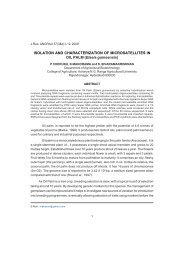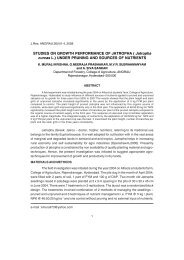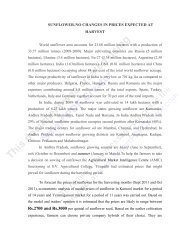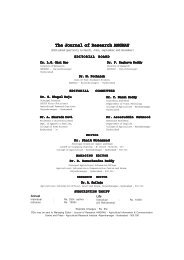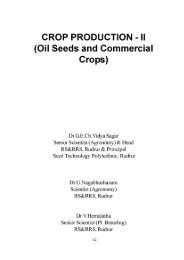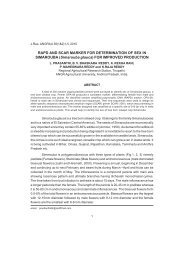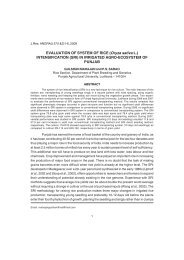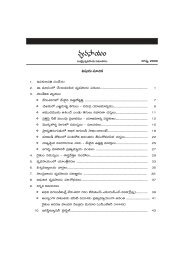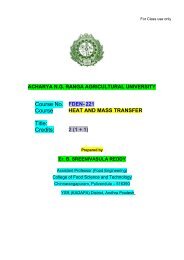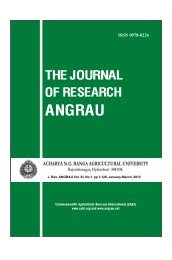physicochemical
Contents of 39(1 & 2) 2011 - acharya ng ranga agricultural university
Contents of 39(1 & 2) 2011 - acharya ng ranga agricultural university
- No tags were found...
You also want an ePaper? Increase the reach of your titles
YUMPU automatically turns print PDFs into web optimized ePapers that Google loves.
ABSTRACTS<br />
motivation and innovativeness of farmers showed<br />
significant relationship with direct changes of adopted<br />
and non-adopted villages.<br />
Suggestions given by the farmers of adopted<br />
villages to overcome the constraints were: awareness<br />
programmes should be conducted about advanced<br />
methods, selection of the real beneficiaries for training<br />
without any political intervention, off campus training<br />
programmes should be conducted and demonstration<br />
units need to be maintained properly.<br />
Political influence should be reduced in the<br />
supply of inputs, provision of marketing and storage<br />
facilities and provision of fertilizers on subsidized rates<br />
were the important suggestions given by the farmers of<br />
non-adopted villages.<br />
Strategy was given for the effective<br />
implementation of KVK towards overall development of<br />
the farmer as providing required knowledge and skill by<br />
conducting more training programmes and<br />
demonstrations, involving practicing farmers from<br />
sample communities with proper selection of<br />
technologies, improve the contact with state department<br />
of agriculture to produce fertilizers on subsidized rates,<br />
soil testing facilities should be carried out on priority,<br />
conducting more vocational training programmes and<br />
income generation activities.<br />
“A study on Entrepreneurial Behaviors of Sugarcane growers in<br />
Mandya district of Karnataka”<br />
Student : Abhishik Gowda. T<br />
Major Advisor: Dr. CH. Ramesh Babu<br />
Department of Extension Education<br />
Entrepreneurship has now been recognized as<br />
a concept not only vital for industries but also in the<br />
development of agriculture. Entrepreneurship stands<br />
as a vehicle to improve the quality of life for individuals,<br />
families and communities and to sustain a healthy<br />
economy and environment. By a simple definition, doing<br />
new things or doing things that are already being done<br />
in a new way is a part of entrepreneurial behavior. With<br />
the said backdrop, a study was conducted to assess the<br />
entrepreneurial behavior of sugarcane growers in<br />
Madhya district of Karnataka.<br />
The data was collected from the sugarcane<br />
growers through a well structured interview schedule,<br />
which was developed keeping in view the objectives of<br />
the study. The data thus collected was coded, tabulated<br />
and analyzed. Finally, the statistical tools like Arithmetic<br />
mean, Standard deviation, frequency, Percentage,<br />
Correlation and Multiple linear regression were used<br />
for meaningful interpretation of findings and for drawing<br />
conclusions.<br />
The findings of personal, socio-economic and<br />
psychological characteristics indicated that majority of<br />
sugarcane growers were middle aged, educated up to<br />
high school, dependent only on agriculture, operating<br />
small size holdings, medium in social, extension and<br />
mass media participation and had low level of credit<br />
orientation. Further they had medium scientific and<br />
management orientation.<br />
The multiple linear regression analysis<br />
indicated that all the nine sub-components of<br />
entrepreneurial behavior put together explained 93 per<br />
cent of variation. The most important three components<br />
in order of their importance were innovativeness,<br />
Information seeking behavior and Decision making<br />
ability, while the three least important components found<br />
in the study were cosmopolitans, risk orientation<br />
leadership ability.<br />
Successful case lets of sugarcane growers<br />
reflected that the farmers orientation with the variables<br />
such as membership in social organizations, contact with<br />
extension agency, participation in agricultural<br />
programmes and favorable attitude towards innovations<br />
were significantly contributed to become an<br />
entrepreneur. M.Sc (Ag), 2008<br />
92



